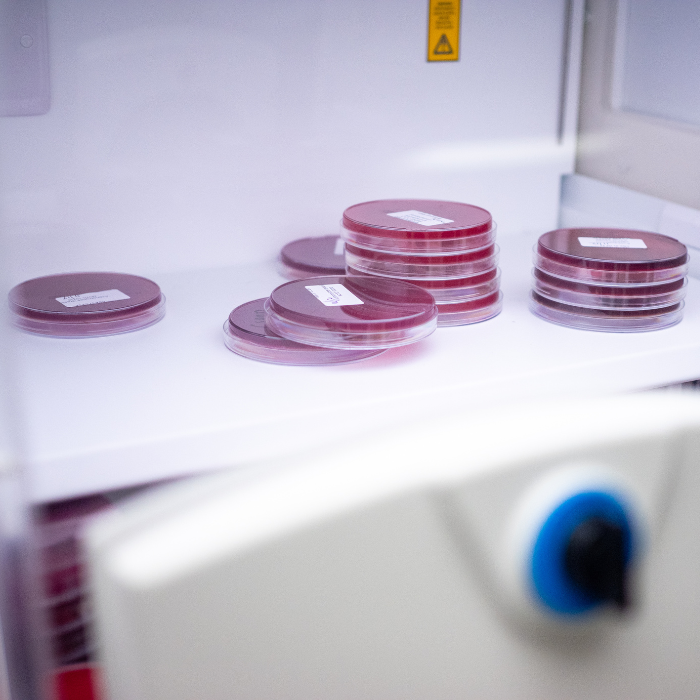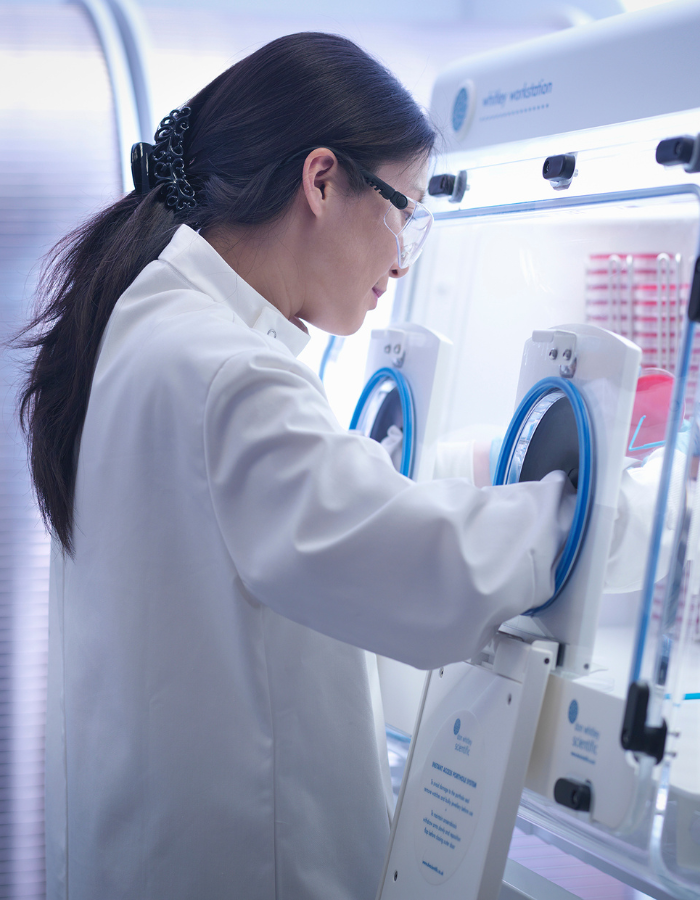
Faecal Microbiota Transplantation (FMT) has emerged as an effective therapy for inflammatory bowel diseases with potential application in non-gastrointestinal disorders. This summary shares findings from 4 investigational studies on the impact of oxygen presence during FMT preparation and its downstream effects on bacterial viability and diversity, and clinical outcomes.
Study 1: Bacterial Viability in Faecal Transplants
(Papanicolas, et al., 2019) investigated the effects of 2 FMT processing protocols (aerobic vs. anaerobic) on stool microbiome viability and diversity using qPCR and 16S rRNA amplicon sequencing. The study revealed that stools processed under strict anaerobic conditions exhibited higher bacterial viability in comparison with stools exposed to ambient air or subjected to freeze-thawing. Processing in ambient air resulted in up to a 12-fold reduction in the abundance of crucial commensal taxa, highlighting the sensitivity of bacterial viability to atmospheric oxygen.
- Stools from 8 donors were processed under strict
anaerobic conditions, in ambient air, and anaerobically with freeze-thawing. - Stools processed immediately under strict
anaerobic conditions were found to have approximately 50% of bacteria as non-viable (normal baseline). - Homogenisation in ambient air or freeze-thawing reduced viability to 19% and 23% respectively.
Study 2: FMT Efficacy in Ulcerative Colitis
(Costello, et al., 2018) aimed to assess the efficacy of anaerobically vs. aerobically prepared FMT in inducing remission in UC patients. The study found that FMT using anaerobically prepared donor stool resulted in a higher likelihood of remission at 8 weeks compared to FMT with autologous stool (aerobically prepared). Based on previous work, the authors already considered anaerobic preparation of stool for FMT to provide superior clinical efficacy.
3 Point Summary:
- 73 adults with mild to moderately active UC were enrolled in a multicenter, randomized, double-blind clinical trial.
- Patients were randomized to receive either anaerobically prepared pooled donor FMT (n = 38) or autologous (aerobically prepared) FMT (n = 35) via colonoscopy followed by 2 enemas over 7 days.
- At week 8, adults receiving anaerobically and aerobically prepared FMT achieved a remission rate of 32% (12/38) and 9% (3/35) respectively.
Study 3: Anaerobic vs. Aerobic Faecal Processing
(Shimizu, et al., 2021) investigated the impact of anaerobic and aerobic faecal processing on the composition of viable microbiota for FMT. The study highlighted that anaerobic preparation contributed to the retention of obligate anaerobes, counteracting the decrease observed in obligate anaerobe groups during the blending process. This finding suggests that anaerobic preparation may play a crucial role in maintaining the efficacy of FMT by facilitating the transfer of essential anaerobic bacteria into patients.
3 Point Summary:
- 16S and 23S rRNA-targeted RT qPCR was used to quantify viable bacteria in faecal suspensions. Primers were used to detect obligate anaerobes and facultative anaerobes.
- Effects of anaerobic vs aerobic preparation were compared using the ratio change (RC) from samples taken immediately after blending and 1hr after blending.
- Atmosphere conditions of the blending procedure affected the proportion of live anaerobes. Obligate anaerobes decreased due to the blending processes, but anaerobic prep significantly mitigated this effect.
Study 4: Anaerobic Faeces Processing Techniques
(Bénard, et al., 2023) conducted a comprehensive study assessing the effects of 4 donor stool processing techniques on bacterial viability. The results confirmed that strict anaerobic stool processing resulted in higher colony-forming unit (CFU) counts compared to aerobic processing. Especially, when combined with short-term storage of frozen material, was found to preserve viability of obligate anaerobes, which may lead to increased clinical success of FMT. Conversely, aerobic processing was associated with increased growth of bacteria linked to FMT nonresponse in UC patients.
- Bacterial viability of 8 human stool samples were measured after anaerobic and aerobic processing of frozen fecal suspensions, processed directly after donation and temporarily stored before processing.
- Strict anaerobic culturing resulted in higher
CFU counts (median of 10.31 log CFU/g feces) compared to aerobic culture CFUs (median of 10.16 log CFU/g feces). - Direct anaerobic processing of donor stool was found to be superior to aerobic processing for the preservation of bacterial viability of
obligate anaerobes and butyrate-producing bacteria related to the clinical response from FMT in ulcerative colitis patients.
The reviewed studies collectively emphasize the significant influence of anaerobic processing on an FMT’s final characterization. Anaerobic processing not only sustains the viability and diversity of essential microbiota but also has been seen to contribute to improved clinical outcomes in UC. These findings underscore the importance of paying attention to anaerobic conditioning during preparation to maximise positive outcomes and therapeutic effectiveness of FMT. Further research in this direction holds promise for refining FMT protocols and advancing its application in gastrointestinal disorders.
Don Whitley Scientific manufacture strict anaerobic workstations currently used in both research and regulatory approved FMT therapies globally.
References
- Bénard, M. V., Arretxe, I., Wortelboer, K., Harmsen, H. J., Davids, M., de Bruijn, C. M., . . . Ponsioen, C. Y. (2023). Anaerobic Feces Processing for Fecal Microbiota Transplantation Improves Viability of Obligate Anaerobes. Microorganisims, 11(9), 2238.
- Costello, S. P., Hughes, P. A., Waters, O., Bryant, R. V., Vincent, A. D., Blatchford, P., . . . Andrews, J. M. (2018). Effect of Fecal Microbiota Transplantation on 8-Week Remission in Patients With Ulcerative Colitis: A Randomized Clinical Trial. JAMA, 321(2), 156-164.
- Papanicolas, L. E., Choo, J. M., Wang, Y., Leong, L. E., Costello, S. P., Gordon, D. L., . . . Rogers, G. B. (2019). Bacterial viability in faecal transplants: Which bacteria survive? The Lancet, 41, 509-516.
- Shimizu, H., Arai, K., Asahara, T., Takahashi, T., Tsuji, H., Matsumoto, S., . . . Yamashiro, Y. (2021). Stool preparation under anaerobic conditions contributes to retention of obligate anaerobes: potential improvement for fecal microbiota transplantation. BMC Microbiology, 275(21).


 au
au




 English
English